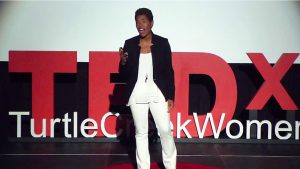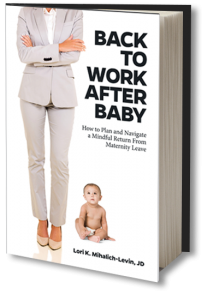 How do we feel about being labeled? Usually pretty crummy, I’d wager. I’m talking here about terms applied to us by others. (Not a title we choose for ourselves or earn in our career.) Labeling us as one thing implies we’re not something else. It can be demeaning. And it minimizes the rest of who we are.
How do we feel about being labeled? Usually pretty crummy, I’d wager. I’m talking here about terms applied to us by others. (Not a title we choose for ourselves or earn in our career.) Labeling us as one thing implies we’re not something else. It can be demeaning. And it minimizes the rest of who we are.
I recently attended the Diversity & Flexibility Alliance’s Annual Conference, where the Honorable Tonya Parker gave an amazingly inspirational talk about her own experience with labels. When she refused to use the power confided in her by the state of Texas to marry heterosexual couples until all couples had an equal right to marry, the media labeled her “The Gay Judge.”
Even if technically accurate, she shared, the label caused her a great deal of internal struggle. It overshadowed any other professional accomplishments she had on the bench. She “disfavors the use of short words and phrases to describe us,” she explained, because “people want to be known, in the fullness of their humanity.”
The Upside of Being Labeled
What brought tears to my eyes during her talk, however, was not her description of the pain the label had caused her. Rather, it was the ways she found to find the positives in the label.
First, she described how the experience of this “Gay Judge” label allowed her to live a more examined life. Having a label “put in lights” made her confront her comfort level with the whole world’s “knowing her label.”
And second, she articulated with such beauty the deeply connective benefit that being labeled “makes us readily accessible to those who need to find us, to relate and feel less trepidation.” It turns out, she said, that labels can help those who face similar struggles. “So that our way, and our walk might be a beacon – a roadmap for the road that lies ahead of them.”
So How About That “Working Mom” Label?
Being labeled as “working mom” can indeed cause the type of harm Judge Parker describes, by implying that if we’re that, we’re not something else. What’s that thing the label implies we’re not? Fully committed to our work. Or to our families.
The juxtaposition of those two words, “working mom,” seems to detract from the strength of either.
And for this reason, so many of us hide. We downplay our home commitments at work. Promise not to “advertise” our flexible arrangements. Censor our enthusiasm about our parenting roles. And at home, we may turn down the dial on expressing our work passions.
What resonated so deeply for me was Judge Parker’s acknowledgment that because her label was so public – there is no hiding when it’s splashed all over the TV and newspapers – members of the LGBTQ+ community were able to find her. They were lawyers who approached the bench “on a personal matter” in court, to tell her how comfortable they felt in her courtroom. Same-sex couples who knew she would fully celebrate their wedding day. Law students looking to be mentored by someone who would understand them.
It’s this benefit of the label that has me on the side of encouraging parents to be very public about their flexible and so-called “reduced hour” arrangements at work. It’s what has me celebrating efforts like “leaving loudly.” Because when we don’t have to hide, we can bring our full selves to work.
Unlike Judge Parker, I have no “bench” at work for others to approach. But colleagues do, with frequency, call or come to my office, shut the door, and say how glad they are there is someone within their ranks who they know will understand the true challenges of working parenthood. The sleepless nights. The daycare struggles. The guilt.
There is such great comfort in knowing you’re not walking a path alone.
And were it not for publicly adopting a label I’m admittedly not super fond of, these colleagues and I may never have found one another.
Watch Judge Parker’s TEDX Talk
When Judge Parker finished her remarks at the Diversity & Flexibility Alliance conference, the audience gave her an immediate a standing ovation. Not one of those “let’s wait a minute to see if anyone stands up,” standing ovations. But more of the “we leapt out of our chairs” variety.
And I whispered to the person next to me, “WOW, that should be a TEDTalk.”
Turns out – and lucky for those of you reading this, it already is. Please take less than 20 minutes and watch it here. Prepare to be inspired.
 If you need more help getting your head in a better place to return to work after maternity leave, join us for the next session of Mindful Return.
If you need more help getting your head in a better place to return to work after maternity leave, join us for the next session of Mindful Return.
Want more practical tips on working parenthood? Check out my book, Back to Work After Baby: How to Plan and Navigate a Mindful Return from Maternity Leave


